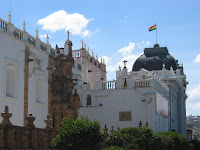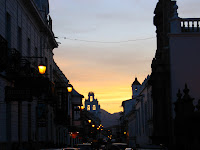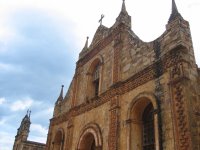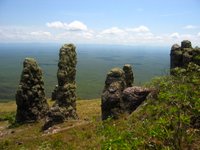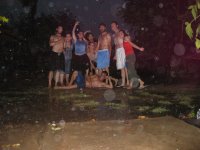
 I went to the campo of Santa Cruz this week to help my friend start a community bank. San Jose de Chiquitos is a town of red dirt roads and spring greens even in the dead of winter. There are bulging trees that are said to hide duende, leprauchan-like creatures that play tricks on people. The Bolivian town is dotted with pocket communities of fierce indigenous nomads and Mennonites, tall Europeans related to the Amish that speak low-German and mostly farm (think Children of the Corn, in dark denim overalls, light blue dress shirts, and straw hats). In the hills you can hike to a great rock formation called Valley of the Moon and collect a fruit that tastes like dates and looks like smooth brown rocks on the ground, but you have to watch out for the crazy three-fingered man that lives there looking for gold. It feels like a fairytale land, or maybe a Hayao Miyazaki film.
I went to the campo of Santa Cruz this week to help my friend start a community bank. San Jose de Chiquitos is a town of red dirt roads and spring greens even in the dead of winter. There are bulging trees that are said to hide duende, leprauchan-like creatures that play tricks on people. The Bolivian town is dotted with pocket communities of fierce indigenous nomads and Mennonites, tall Europeans related to the Amish that speak low-German and mostly farm (think Children of the Corn, in dark denim overalls, light blue dress shirts, and straw hats). In the hills you can hike to a great rock formation called Valley of the Moon and collect a fruit that tastes like dates and looks like smooth brown rocks on the ground, but you have to watch out for the crazy three-fingered man that lives there looking for gold. It feels like a fairytale land, or maybe a Hayao Miyazaki film.The students are on winter vacation, and it´s quieter and cooler than the last time we were here in the stifling spring heat. Cooler meaning, you still don´t have to sleep with a blanket and cold bucket baths feel great in the afternoon. Jenny´s counterpart is a priest named Brother Melchor. He is like a jolly little elf and claps and shouts “Ánimo!” after each of our ideas. He lives with two other priests in a cozy little house in the ghettos of San Jose and they are all teachers at the Catholic Marista high school. The hermanos Melchor, Nacho, and Francisco are wonderful. They feed us lunch and tell us animated stories with exaggerated facial expressions like cartoon characters. I miss the fireworks and BBQ´s of a real 4th of July, but we bake a lemon pie for the brothers and spend the evening playing basketball with the orphanage kids Jenny works with. “Basketball” is any number of kids grabbing the ball and running halfway across the court before dribbling it twice and throwing a wild pot shot. There are 2 full-court basketball games and a soccer match taking place on the same court, miraculously without any casualties.
It is a nice break from malingering in my office, trying to track down people who don´t want to work with me. But it´s a short break; the blockade rumors begin in the afternoon. A paro near the border of Brasil, which will block the train from arriving in San Jose. Then, protestors demanding “autonomia indigena” close in on all roads to Santa Cruz. By the time we catch the last spots on a 2 a.m. train back to the city the miners have locked down the altiplano and the students are blockading Sucre roads. It´s an all-star week of civil unrest. Back in Santa Cruz I gorge myself on all the food and shopping I don´t have in Sucre. The city is decked out in green and white; the departmental colors of Santa Cruz and the autonomia movement in general. July 2 was the anniversary of the movement and everywhere banners and t-shirts scream “100% Camba” and “¡Autonomia, Carajo!” I assume that´s what the demonstraters on the street are saying too; the cambas drop their s´s and slur and I cannot understand a damn word they say.
Somehow, the only road not blockaded is the old, unpaved road between Santa Cruz and Sucre, so I am able to get back home via a 14-hour rattling wreck of a bus ride. When I left Sucre last week, police were lining the streets to protect the Constituent Assembly from torch-bearing students protesting state control of the university. In typical Bolivian fashion, it flared up and died down within the week. Now the new constitution, originally due August 6, has been postponed to December. So we can look forward to another half year of come-and-go blockades until the constitutional blowout. Ánimo!
FUN FACT / QUOTE OF THE DAY: “This would be SO much better if we had, like, a 40% chance of getting kidnapped.”






